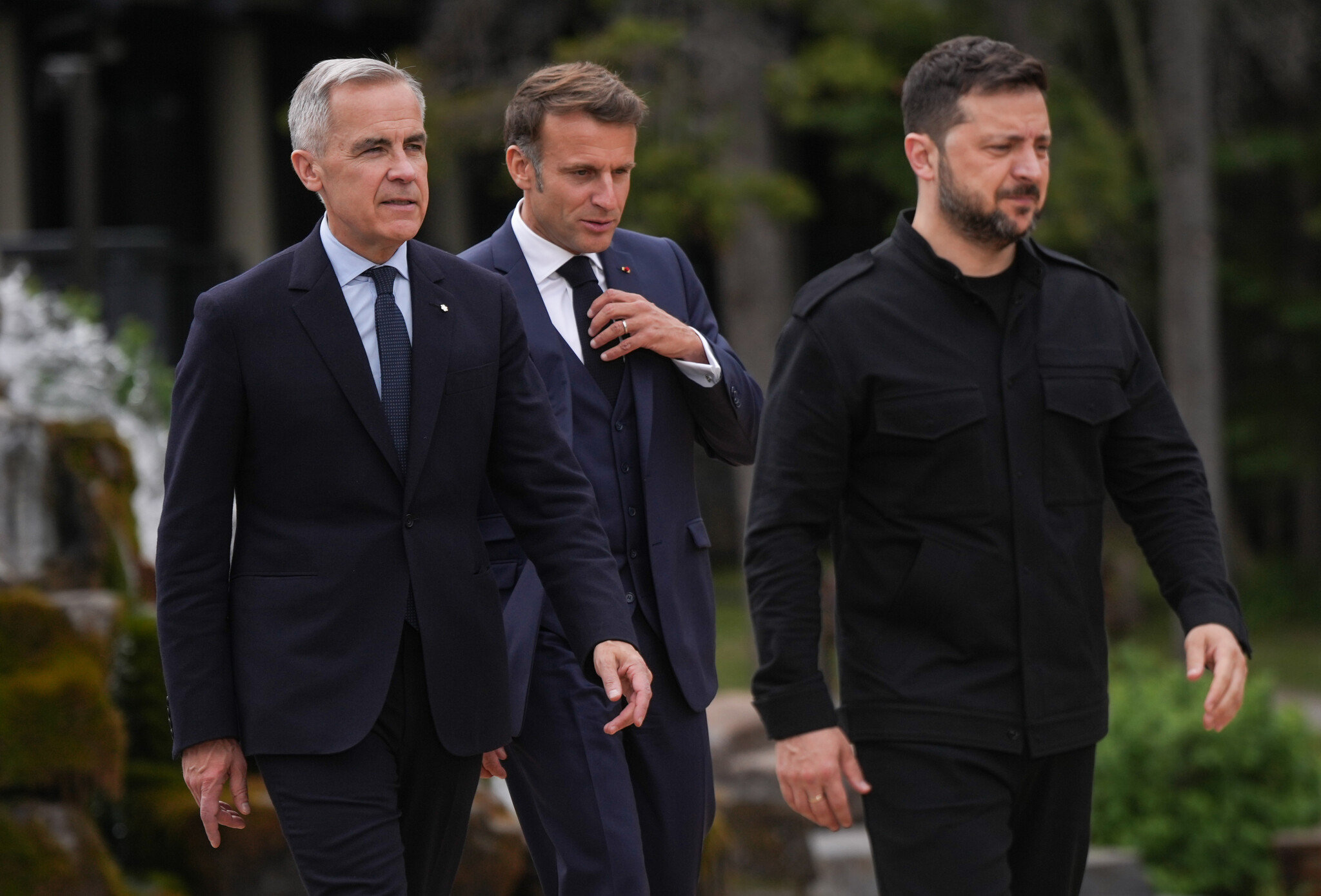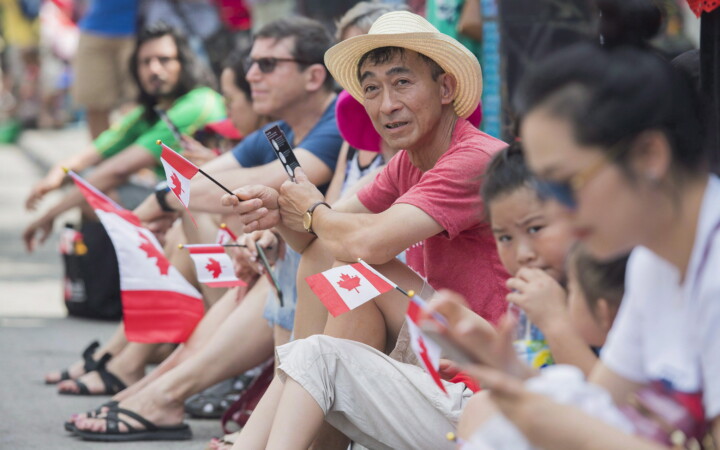‘Stop the fantasy’: Carney’s Ukraine peacekeeping commitment is political theatre
Sean Speer, The Hub’s editor-at-large, joins co-founder Rudyard Griffiths to analyze Prime Minister Mark Carney’s recent comments about potentially deploying Canadian troops in Ukraine as part of a post-conflict peacekeeping mission. They examine the stark disconnect between Canada’s ambitious foreign policy rhetoric and its severely limited military capacity, and how Carney’s commitment represents political theatre rather than reality.
You can listen to this episode on Amazon, Apple, and Spotify.
Program Transcript
This is an automated transcript. Please check against delivery.
RUDYARD GRIFFITHS: boots on the ground. That’s right. Mark Carney is talking about a role for Canadian troops in Ukraine in the event of a ceasefire or peace deal to help break it all down, and what it means for Canada’s national security. I’m joined by my co founder at The Hub, Sean Speer.
SEAN SPEER: Great to join you as always, Rudyard.
RUDYARD GRIFFITHS: Sean, I want to pick up on what’s coming out of Mark Carney’s trip to Ukraine over the weekend, celebrating Independence Day for the country in Kyiv. He’s commenting that Canadian troops could conceivably be deployed on the ground in Ukraine in the event of either a ceasefire or some kind of permanent settlement of this conflict between Russia and Ukraine. What do you make of this, and particularly Sean, to what extent is this a meaningful offer on Canada’s part?
SEAN SPEER: There’s so many different ways to take this conversation. You have a much stronger understanding of the defence and security issues that I do that what struck me about much of what the prime minister has said during this trip, Rudyard is how it’s in keeping with you. Recall his first trip as prime minister, which was not to the United States, but to Europe, where he described Canada, as if I recall correctly, the most European of non European countries. It’s clear based. On his experience and his his connections and his networks, that he is drawn towards the European continent, and in that sense, there’s it’s somewhat intuitive that he would be inclined towards playing a role in Ukraine, a conflict that really has become characterised in continental terms. But I don’t think we should lose sight, Richard, of how limited our economic relationship is with Europe. We do more export. The value of exports to the US are bigger in a single month than they are for a full year to Europe. And so this idea, roger that a quote unquote pivot to Europe can be part of a economic and security strategy just starts to fall apart when you look under the hood and consider just how significantly smaller our relationship is. So in that sense, I don’t know what to make precisely of this commitment to peacekeeping, but I just think at the root of it, Carney’s instinct towards Europe just doesn’t hold up to the facts.
RUDYARD GRIFFITHS: Yeah, yeah. I’ll build on that, just take a slightly different direction. We, you know, Sean, we have 57 peacekeepers deployed globally right now, Canada, around the entire world. Our largest single international troop deployment is brigade, 2000 Canadian servicemen and women in Latvia. God bless them for being there. But we’ve had reports in the last year that they were given vouchers to buy their own food because we didn’t even have the commissary and other kind of supports and functions to feed our troops ourselves in Latvia. In other words, there is a huge gap, Sean, between, I guess, the perception of our pm and the reality of our defence and security capacity. And I’ll just call it for what it is, Sean, I think there’s some I think the prime minister is being disingenuous here. He can talk about Canada participating in a post settlement Ukraine. Great, but our contribution, vis a vis what the Americans could contribute, or what any of the European militaries to contribute could contribute, is insignificant.
Let me throw it back to you, what this is Sean is it’s politics and it’s smart politics. It is a play to nostalgia, to a view of a Canada that is long gone, the Canada of Lester B. Pearson, the indispensable middle power, the nation of peacekeepers Mark Carney, is playing on these mystic chords of memory, to quote a little bit of Lincoln this morning, and he’s doing it damn effectively with all the older Boomer voters who grew up in that world and loved that world and want to go back to that world. But ladies and gentlemen, that world is over. Canada has under spent. We have feathered our own nest. As you said, Sean, we’ve gone for butter over guns for over a generation, mostly at the bequest and political desire of all those boomers out there cheering on the idea that Canada can be some plucky little, indispensable Peacekeeper in Ukraine. Give me a break. You know, we need to rebuild our military. It’s going to take a decade or more before these types of perfunctory gestures that the prime minister is making are anything close to a reality, a commitment that matters to the people of Ukraine and to the security of this war torn country. Sorry, I’ve gone on a bit of a rant here, but I really do think this is, this is kind of politics over substance, and, yes, I think we need to call it out.
SEAN SPEER: Yeah, it’s not lost on me, Rudyard, that Canada’s Department of Foreign Affairs, where, I think now it’s called Global Affairs, is housed in the Lester B. Pearson building down on on Sussex in Ottawa. There’s been a generation of of public servants there who’ve told themselves about the significance of so called soft power and and I think we’re, we’re being reminded every day that soft power doesn’t get you in the room, hard power does. You recall that last week, there was this major meeting of your Ukrainian allies in the White House. Canada, of course, was excluded from that meeting. I think there’s just a growing recognition in different parts around the world that, besides kind words and good hearted gestures, there’s not much that Canada can contribute. I’ll turn it back to you in a second, but I just want to emphasise one point that really derives from my experience in Ottawa, where I worked in the prime minister’s office for the better part of five or six years. Yes, of course, I agree with you, Rudyard, that a big part of the problem is that successive governments, including the Harper government, neglected our defence capacity, and we are now reaping those consequences. But this is an important point. We spent a lot of money on national defence, still not as much as we should, but we spend a lot, and it is a scandal, Rudyard, that so much of those dollars are swallowed up in administration in Ottawa. And you know these like armchair generals, you know, in different parts of the country. Like one thing I will say in defence of Prime Minister Trudeau is, I think successive Prime Ministers have been partly reluctant to dump money into the Department of Defence because they have no confidence in the department itself, that it is top heavy, that it’s been marked by this awful string of sexual assault scandals, like I think there is something kind of fundamentally broken in the Department of Defence, and so yes, the political arm the government deserves blame for not investing in our defence capacity, but it’s an unspoken truth that successive governments have had no confidence in the department defence, and I think in some ways that’s like a precondition to rebuilding a military such that we can be in those rooms and make a useful contribution to global security.
RUDYARD GRIFFITHS: Yeah, well said, and look, I’ll resume. I’ll ring off what you’ve just mentioned there, which is, this is not Mark Carney’s fault. These are the decisions of multiple governments before him, and he has made, to his credit, a commitment to, you know, surge our defence spending well above our NATO target. Now we’re going to have to see how we pay for that. We have a broken procurement system in Canada, even if we have the dollars, can we, can we buy the gear? And can we get our troops using the gear? These are all kind of known unknowns. They’re good ones to have. And I support that. I support what the prime minister has done there, but what I don’t support, Sean, is using that commitment to make these perfunctory political gestures that are empty. There is there is empty right now, as the as the air that that the Prime Minister is breathing, is breathing to to excel, these kind of, these pledges of of solidarity, and more importantly, you know, quote, troops on the ground, a kind of view, as if Canada was somehow able to actually provide that capacity, again, in any way, meaningful shape or form, and it’s just not the truth. So you know, Prime Minister Carney, continue with your defence spending. I, for one, would happy to pay for more taxes if I knew my taxes were going explicitly to defence and that it was being done on an efficient and effective basis. But what I’m tired about is successive prime ministers, Justin Trudeau was a serial offender here, coming out and engaging, you know, with, you know, this kind of habitual chest thumping, as if to kind of prove our status as a G7 member, when on the defence and security metric, we don’t belong in that club, Sean. We’re nowhere near membership in that club in terms of actual capacity, ratio of teeth to tail and what we can bring to a conflict zone, whether it’s Ukraine or anywhere else in the world. So let’s get real and start having a conversation with defence and security that acknowledges just that the state that we are building from the low levels of capacity that we currently have. And and end the hyperbole. Stop the fantasy. Stop playing Canadians, you know, on their yearnings, either nostalgic yearnings for an era that has long come and gone.
SEAN SPEER: Yeah, well, said, I couldn’t agree with that more. And I would say if the prime minister was prepared to demonstrate that he understood the depth and the nature of these problems, one of the first steps he could do would be to appoint former Liberal MP Andrew Leslie as an advisor on these issues. One of the biggest mistakes that the Harper government made was they received a report from then general Leslie that documented the extent to which the problem wasn’t just money, although money was a problem, but it was principally around the organisation and structure the department itself, the Harper government, in the end, ultimately sided with Leslie’s critics within the department, and that report and its recommendations went unaddressed. It’s now been 15 years or longer, those those issues have only gotten worse and gone further unaddressed. Leslie was right then, and he would be right now. And as I say, I think actually getting to the heart of some of those problems in the department are a precondition to making those investments in a way that give Canadians confidence and give Canada the capacity to make a difference on the global stage.
RUDYARD GRIFFITHS: Here, here. Okay, Sean, we’ll continue to follow this file closely at The Hub. It’s important one to our national security, our independence, yeah, important that we and our viewers and listeners are paying attention. So thank you for doing that with us today, Sean.
SEAN SPEER: Yeah, always a pleasure.



